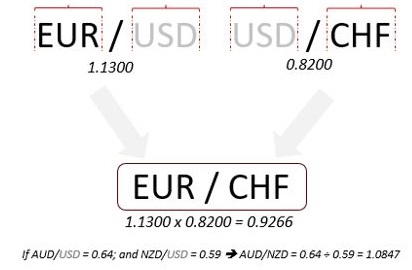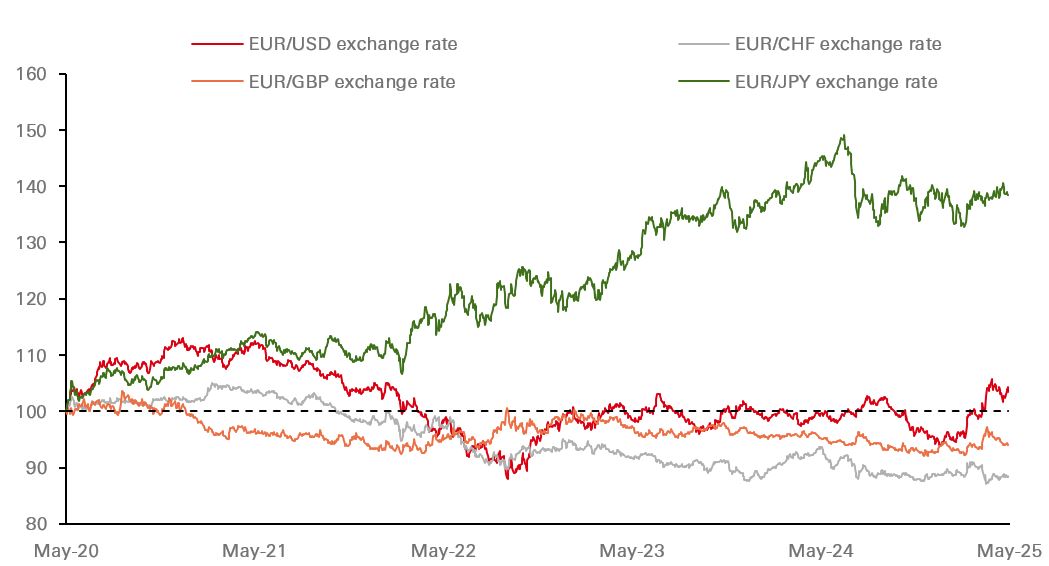
25 June 2025
Rodolphe Bohn
FX and Commodities Strategist, HSBC Global Private Banking and Wealth
In the FX market, the US dollar (USD) is the standard to measure international exchange rates (e.g. EUR/USD, GBP/USD), as the liquidity and size of the USD market make it the primary currency for many countries’ reserves and global trade and finance. However, there is growing interest in cross currencies nowadays.
The exchange rate of two currencies, without using the USD, is commonly known as a cross-currency pair, such as EUR/GBP, EUR/JPY, GBP/CHF or AUD/NZD. In practice, investors can exchange one currency for another without buying USD as an exchange currency.
IIIustration of how cross currency pairs are built

For instance, by looking at the performances of EUR versus different currencies, we notice that it performed better against some and not as well against others.
EUR’s past performance depending on the counter currency

For personal aspirations – For customers based outside of the US, cross-currency exchanges are needed for travelling, overseas property purchases, paying for children’s education abroad and retirement in foreign countries, to name a few. There are many reasons for customers to hold currencies other than the USD.
For hedging and investing – There could be some advantages to the use of cross currencies to hedge against currency risk, as not all currencies move in the same direction. Investing in different currencies can increase diversification and potential returns for portfolios, reducing reliance on a single currency.
There are also some investment products that link the performance of two different currencies, allowing customers to enjoy a higher return than a normal foreign currency time deposit. Normally, investors would choose the two currencies that concern them the most or they have a view on. For more experienced investors, they may capture arbitrage opportunities by exploiting the price discrepancies between currency pairs for better returns.
Risks to note
Overall, investors could consider cross-currency opportunities if they want to limit their exposure to the USD, or when they have assets or liabilities denominated in other currencies than the USD. However, it is important to note that domestic factors, such as GDP growth, inflation, unemployment data, the central bank monetary guidance and political situations, could impact the outlook for the domestic currency. Importantly, the relative performance of these factors across countries can be even more relevant when assessing the future moves of cross-currency pairs. Since the FX market is fast-moving, investors should evaluate the risks and opportunities of cross currencies to align their investment goals with their risk tolerance.






WARNING: THE CONTENTS OF THIS DOCUMENT HAVE NOT BEEN REVIEWED BY ANY REGULATORY AUTHORITY IN THE PEOPLE’S REPUBLIC OF CHINA OR ANY OTHER JURISDICTION. YOU ARE ADVISED TO EXERCISE CAUTION IN RELATION TO THE INVESTMENT AND THIS DOCUMENT. IF YOU ARE IN DOUBT ABOUT ANY OF THE CONTENTS OF THIS DOCUMENT, YOU SHOULD OBTAIN INDEPENDENT PROFESSIONAL ADVICE.
This document has been issued by HSBC Bank (China) Company Limited (the “Bank”) in the conduct of its regulated business in China. It is not intended for anyone other than the recipient. The contents of this document may not be reproduced or further distributed to any person or entity, whether in whole or in part, for any purpose. This document must not be distributed to the United States, Canada or Australia or to any other jurisdiction where its distribution is unlawful. All non-authorised reproduction or use of this document will be the responsibility of the user and may lead to legal proceedings.
This document has no contractual value and is not and should not be construed as an offer or the solicitation of an offer or a recommendation for the purchase or sale of any investment [in any jurisdiction in which such an offer is not lawful] or subscribe for, or to participate in, any services. The Bank is not recommending or soliciting any action based on it.
The information stated and/or opinion(s) expressed in this document are provided by HSBC Bank (China) Company Limited. We do not undertake any obligation to issue any further publications to you or update the contents of this document and such contents are subject to changes at any time without notice. They are expressed solely as general market information and/or commentary for general information purposes only and do not constitute investment advice or recommendation to buy or sell investments or guarantee of returns. The Bank has not been involved in the preparation of such information and opinion.
The Bank and HSBC Group and/or their officers, directors and employees may have positions in any securities or financial instruments mentioned in this document (or in any related investments) (if any) and may from time to time add to or dispose of any such securities or financial instruments or investments. The Bank and its affiliates may act as market maker or have assumed an underwriting commitment in the securities or financial instruments discussed in this document (or in related investments) (if any), may sell them to or buy them from customers on a principal basis and may also perform or seek to perform investment banking or underwriting services for or relating to those companies.
The information contained within this document has not been reviewed in the light of your personal circumstances. Please note that this information is neither intended to aid in decision making for legal, financial or other consulting questions, nor should it be the basis of any investment or other decisions. You should carefully consider whether any investment views and investment products are appropriate in view of your investment experience, objectives, financial resources and relevant circumstances and make investment decision on your own. The relevant product offering documents should be read for further details.
Some of the statements contained in this document may be considered forward-looking statements which provide current expectations or forecasts of future events. Such forward looking statements are not guarantees of future performance or events and involve risks and uncertainties. Such statements do not represent any one investment and are used for illustration purpose only. Customers are reminded that there can be no assurance that economic conditions described herein will remain in the future. Actual results may differ materially from those described in such forward-looking statements as a result of various factors. We can give no assurance that those expectations reflected in those forward-looking statements will prove to have been correct or come to fruition, and you are cautioned not to place undue reliance on such statements. We do not undertake any obligation to update the forward-looking statements contained herein, whether as a result of new information, future events or otherwise, or to update the reasons why actual results could differ from those projected in the forward-looking statements.
Investment involves risk. It is important to note that the capital value of investments and the income from them may go down as well as up and may become valueless and investors may not get back the amount originally invested. Past performance contained in this document is not a reliable indicator of future performance whilst any forecasts, projections and simulations contained herein should not be relied upon as an indication of future results. Past performance information may be out of date. For up-to-date information, please contact your Relationship Manager.
Investment in any market may be extremely volatile and subject to sudden fluctuations of varying magnitude due to a wide range of direct and indirect influences. Such characteristics can lead to considerable losses being incurred by those exposed to such markets. If an investment is withdrawn or terminated early, it may not return the full amount invested. In addition to the normal risks associated with investing, international investments may involve risk of capital loss from unfavourable fluctuations in currency values, from differences in generally accepted accounting principles or from economic or political instability in certain jurisdictions. Narrowly focused investments and smaller companies typically exhibit higher volatility. There is no guarantee of positive trading performance. Investments in emerging markets are by their nature higher risk and potentially more volatile than those inherent in some established markets. Economies in emerging markets generally are heavily dependent upon international trade and, accordingly, have been and may continue to be affected adversely by trade barriers, exchange controls, managed adjustments in relative currency values and other protectionist measures imposed or negotiated by the countries with which they trade. These economies also have been and may continue to be affected adversely by economic conditions in the countries in which they trade. Investment schemes are subject to market risks. You should read all scheme related documents carefully.
Copyright © HSBC Bank (China) Company Limited 2026. All rights reserved. No part of this publication may be reproduced, stored in a retrieval system, or transmitted, on any form or by any means, electronic, mechanical, photocopying, recording, or otherwise, without the prior written permission of HSBC Bank (China) Company Limited